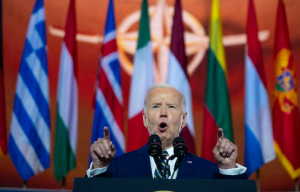Joe Biden has announced that Nato countries will provide Ukraine with five new strategic air defense systems as leaders began a summit in Washington where the alliance was expected to declare Ukraine’s path toward Nato to be “irreversible”.
The promise of weapons deliveries, including anti-air defenses sought after by Ukrainian president Volodymyr Zelenskiy, came just a day after a deadly missile strike against a pediatric cancer hospital and other civilian targets in Ukraine that Biden called a “horrific reminder of Russia’s brutality”.
The headline speech was a critical step to convincing foreign leaders that Biden, 81, remains up to the task of leading the 32-member military alliance. It was also a key test in saving his presidential campaign following a disastrous debate against Donald Trump that led many in his own party to question his mental acuity.
In forceful tones, Biden said: “Before this war, Putin thought Nato would break. Today, Nato is stronger than it’s ever been in its history. When this senseless war began, Ukraine was a free country. Today it’s still a free country and the war will end with Ukraine remaining a free and independent country.”
“Russia will not prevail,” he said to rising applause. “Ukraine will prevail.”
It was announced on Tuesday that the US and its European allies would act to bolster Ukraine’s air defences at a time when the country is under constant heavy bombardment from Russia.
The US, Germany and Romania would send additional batteries of the Patriot air defence system while Patriot components donated by the Netherlands would enable another battery to operate, according to a statement by the leaders of the US, the Netherlands, Germany, Italy and Romania.
The Italian prime minister, Giorgia Meloni, approved the donation of a Italian-French-made equivalent of the Patriot interceptor, the SAMP/T air defence system.
“These five strategic air defence systems will help to protect Ukrainian cities, civilians, and soldiers, and we are coordinating closely with the Ukrainian government so that these systems can be utilised rapidly,” the statement said. “We are working on a further announcement this year of additional strategic air defence systems for Ukraine.”
As well the medium range Patriot and SAMP/T systems, the US and its allies said they would provide Ukraine with dozens of shorter-range tactical systems, including the US-Norwegian made NASAMS, US-made Hawks, Iris systems made by a European consortium and German Gepard missiles.
Britain’s new prime minister, Keir Starmer, and Ukraine’s president, Volodymyr Zelenskiy, were among those arriving at the US capital amid a warning that Russia could step up missile strikes on Ukraine this week, repeating a barrage that killed at least 38 on Monday.
Diplomats said that a final communique would likely declare Ukraine’s path to Nato to be “irreversible” and to move control of the Ukraine Defense Contact Group, the main conduit for delivering military aid and training to Ukraine, under Nato control.
Free daily newsletter
Our US morning briefing breaks down the key stories of the day, telling you what’s happening and why it matters
Privacy Notice: Newsletters may contain info about charities, online ads, and content funded by outside parties. For more information see our Privacy Policy. We use Google reCaptcha to protect our website and the Google Privacy Policy and Terms of Service apply.
after newsletter promotion
Those steps are widely seen as an attempt to “Trump-proof” Nato policies from the potential for a new Republican administration to cut aid to Ukraine, or possibly to make it contingent on holding direct negotiations with Russia.
But otherwise there will be no meaningful progress on Ukraine joining Nato in Washington, although alliance members will seek to dress up the latest package of support as part of what is described as “a bridge to membership”.
Holdouts including the US, Hungary, Germany and Italy are concerned that allowing Ukraine to join Nato while the war with Russia continues would be considered an escalation that could bring the alliance into direct conflict with Moscow. Even a more limited form of what could be considered direct military intervention in support of Kyiv attracts similar concerns.
Jens Stoltenberg, Nato’s outgoing secretary general, speaking immediately before Biden, sought to justify continued US and western support for Ukraine by arguing that “the biggest cost and the greatest risk will be if Russia wins in Ukraine”. Authoritarian leaders in China, North Korea and Iran would all feel emboldened if Russia conquered its neighbour, he added, describing the war as a struggle over values.
“They all support Russia’s brutal war. They all want Nato to fail. So the outcome of this war will shape global security for decades to come. The time to stand for freedom and democracy is now the place is Ukraine,” the Nato chief added. Biden subsequently awarded Stoltenberg, the presidential medal of freedom, the highest civilian honour in the US.
In remarks to the Guardian, Ruslan Stefanchuk, Chairman of the Verkhovna Rada of Ukraine, said that the strike on the Okhmatdyt children’s hospital should be a “turning point” in the war and lead to great supplies of anti-air weapons to Ukraine.
“I believe that what happened today must be a turning point to change everyone’s attitude to what is happening in Ukraine, and I believe that without the F-16 fighter jets, without the new air defence systems, without the ammunition for those systems, we won’t be able to cover the skies to defend Ukraine,” he said.
The Guardian

